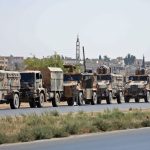At about two in the morning on August 21, 2013, 1,003 Syrian adults and 426 children took their last breath. Since then, the world has been shocked by videos of people vomiting and fainting, their muscles seizing, struggling to breathe as their nerves are electrified and their lungs become paralyzed – victims of a chemical attack. These scenes have continued to unfold as Syrians are repeatedly attacked with chemical weapons – often by their own government – and the world stands by quietly watching.
Now, a full-scale offensive by the Syrian government is imminent – one that will allow Bashar al-Assad, the same leader who has been gassing his own people, to regain full control of Syria. The city of Idlib, the last remaining opposition stronghold, has been continuously hit with air strikes and shelling this past month and Syrian troops have been gathering around the northern governorate. Meanwhile, the opposition’s brigades are to the north of Idlib and supporters of the militant group Hayat Tahrir al-Sham are to the south. Additionally, Türkiye has set up a dozen military posts and the United States has deployed around 2,000 troops in the northeast of Syria.
A full-on attack on Idlib would be devastating for the civilian population. Roughly three million people live in the city, half of whom settled there after fleeing violence elsewhere in Syria. An attack now could cause significant casualties and displace hundreds of thousands of people, forcing many to flee north towards Türkiye’s closed border. But the looming threat is one Syrians know too well: chemical weapons.
We have seen what chemical weapons can do. There have been at least 85 confirmed chemical weapon attacks since the conflict in Syria began more than seven years ago. Most attacks are suspected to involve chlorine, which can cause severe respiratory distress. Sarin, white phosphorous, and mustard gas have also reportedly been used. The most recent attack, on April 7, 2018 in Douma, Eastern Ghouta, killed more than 40 people and injured more than 500 others.
The use of chemical weapons is a war crime, and its use in a widespread and systematic manner against a civilian population is a crime against humanity. While both the Obama and Trump administrations have claimed that the use of chemical weapons is a “red line,” there has not been any significant international response to the situation in Syria.
This is not the first time international norms have been violated in the Syrian conflict. Physicians for Human Rights has corroborated 492 attacks on health care sites, including 79 hospitals that were struck at least twice, between March 2011 and December 2017, and has reported the killing of 847 medical personnel. These attacks undermine health care, endanger health professionals, and limit the flow of medical and humanitarian supplies to civilians in need; as such, they are considered violations of medical neutrality, the principle of noninterference with medical services in times of armed conflict. The use of chemical weapons is a breach of the Geneva Conventions on the laws of war.
With the battle over Idlib looming, it is more important than ever for the international community to take a stand and insist that the Syrian government and its Russian allies prioritize civilian safety, avoid unnecessary loss of human life, and refrain from using any chemical weapons under any circumstance. The civilian casualties from a large-scale attack on Idlib would be catastrophic for an already severely-impacted population, exhausted from seven years of war. We will not be able to say that we did not see it coming.

